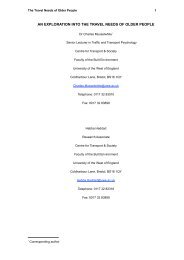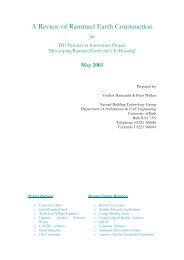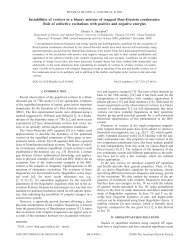Contents - Student subdomain for University of Bath
Contents - Student subdomain for University of Bath
Contents - Student subdomain for University of Bath
Create successful ePaper yourself
Turn your PDF publications into a flip-book with our unique Google optimized e-Paper software.
2.3. GREATEST COMMON DIVISORS 45<br />
Lemma 1 In these circumstances, the result <strong>of</strong> Euclid’s algorithm is a linear<br />
combination <strong>of</strong> f and g, i.e. a i−1 = λ i−1 f + µ i−1 g: λ i−1 , µ i−1 ∈ K[x].<br />
Pro<strong>of</strong>. a 0 and a 1 are certainly such combinations: a 0 = 1·f +0·g or 1·g +0·f<br />
and similarly <strong>for</strong> g. Then a 2 = a 0 − q 1 a 1 is also such a combination, and so on<br />
until a i−1 , which is the result.<br />
The above theory, and algorithm, are all very well, but we would like to<br />
compute (assuming they exist!) greatest common divisors <strong>of</strong> polynomials with<br />
integer coefficients, polynomials in several variables, etc. So now let R be any<br />
g.c.d. domain.<br />
Definition 29 If f = ∑ n<br />
i=0 a ix i ∈ R[x], define the content <strong>of</strong> f, written<br />
cont(f), or cont x (f) if we wish to make it clear that x is the variable, as<br />
gcd(a 0 , . . . , a n ). Technically speaking, we should talk <strong>of</strong> a content, but in the<br />
theory we tend to abuse language, and talk <strong>of</strong> the content. Similarly, the primitive<br />
part, written pp(f) or pp x (f), is f/cont(f). f is said to be primitive if<br />
cont(f) is a unit.<br />
Proposition 14 If f divides g, then cont(f) divides cont(g) and pp(f) divides<br />
pp(g). In particular, any divisor <strong>of</strong> a primitive polynomial is primitive.<br />
The following result is in some sense a converse <strong>of</strong> the previous sentence.<br />
Lemma 2 (Gauss) The product <strong>of</strong> two primitive polynomials is primitive.<br />
Pro<strong>of</strong>. Let f = ∑ n<br />
i=0 a ix i and g = ∑ m<br />
j=0 b jx j be two primitive polynomials,<br />
and h = ∑ m+n<br />
i=0 c ix i their product. Suppose, <strong>for</strong> contradiction, that h is not<br />
primitive, and p is a prime 23 dividing cont(h). Suppose that p divides all the<br />
coefficients <strong>of</strong> f up to, but not including, a k , and similarly <strong>for</strong> g up to but not<br />
including b l . Now consider<br />
k−1<br />
∑<br />
c k+l = a k b l + a i b k+l−i +<br />
i=0<br />
∑k+l<br />
i=k+1<br />
a i b k+l−i (2.9)<br />
(where any indices out <strong>of</strong> range are deemed to correspond to zero coefficients).<br />
Since p divides cont(h), p divides c k+l . By the definition <strong>of</strong> k, p divides<br />
every a i in ∑ k−1<br />
i=0 a ib k+l−i , and hence the whole sum. Similarly, by definition <strong>of</strong><br />
l, p divides every b k+l−i in ∑ k+l<br />
i=k+1 a ib k+l−i , and hence the whole sum. Hence p<br />
divides every term in equation (2.9) except a k b l , and hence has to divide a k b l .<br />
But, by definition <strong>of</strong> k and l, it does not divide either a k or b l , and hence cannot<br />
divide the product. Hence the hypothesis, that cont(h) could be divisible by a<br />
prime, is false.<br />
Corollary 2 cont(fg) = cont(f)cont(g).<br />
23 The reader may complain that, in note 22, we said that the ability to compute g.c.d.s<br />
was not equivalent to the ability to compute unique factors, and hence primes. But we are<br />
not asking to factorise cont(f), merely supposing, <strong>for</strong> the sake <strong>of</strong> contradiction that it is<br />
non-trivial, and there<strong>for</strong>e has a prime divisor.



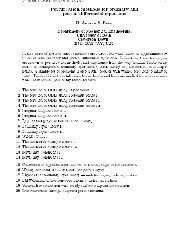
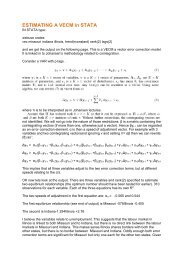

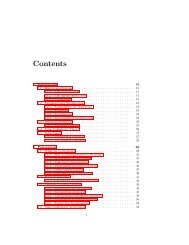

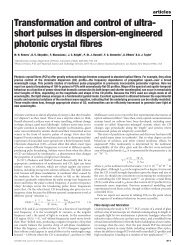
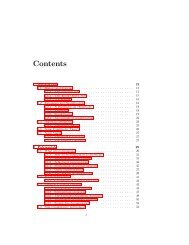

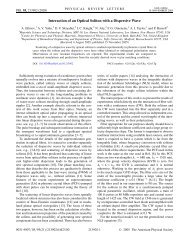
![[Luyben] Process Mod.. - Student subdomain for University of Bath](https://img.yumpu.com/26471077/1/171x260/luyben-process-mod-student-subdomain-for-university-of-bath.jpg?quality=85)

